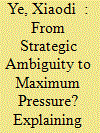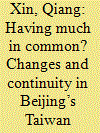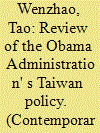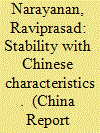|
|
|
Sort Order |
|
|
|
Items / Page
|
|
|
|
|
|
|
| Srl | Item |
| 1 |
ID:
097026


|
|
|
|
|
| Publication |
2010.
|
| Summary/Abstract |
The rise of China, the European Union's (EU's) increasing trade deficit with the People's Republic of China (PRC), and the ongoing negotiations on a new cooperative agreement have all recently contributed to the growing debate over the EU's China policy. Following the coming into effect of theLisbon Treaty, new trends in Asian integration and particularly the fruitful détente between the PRC and Taiwan have been exerting increasing pressure on the EU to rethink and reformulate its current strategy on China and its policy toward Taiwan. A reviewof the development of the EU-Taiwan relationship over the past three decades will be followed by an analysis of the structural factors that have shaped it. Emerging new factors will be examined and their probable consequences for this bilateral relationshipwill be evaluated in order to understand the measures that the EU may adopt in the Taiwan Strait in the new regional and inter-regional context. According to the author's analysis, the EU is under increasing pressure to adopt a more active and politicized strategy in the Strait. In pursuit of its long term interests, the EU should cooperate with the United States vis-à-vis the PRC and insist upon its core values during its engagement in the Strait.
|
|
|
|
|
|
|
|
|
|
|
|
|
|
|
|
| 2 |
ID:
188942


|
|
|
|
|
| Summary/Abstract |
How do changes in US Taiwan policy play out? What is the logic behind these changes? To address these questions, existing studies have formulated four schools of explanation, providing valuable theoretical insights. However, these studies have obvious problems with unidirectional dichotomy and thus fail to identify a causal mechanism explaining the long-term trajectory of US Taiwan policy. This article conducts a re-typology of US Taiwan policy to break the traditional strategic ambiguity–clarity dichotomy by establishing three key indicators and argues that the orientation of US China policy and Taiwan’s US policy are the two major factors triggering changes. By conceptualizing and operationalizing the two independent variables as engagement-oriented, coopetition-oriented, containment-oriented, and hedging/bandwagoning/binding, this article develops a systemic theoretical framework to demonstrate how the US Taiwan policy transits between strategic clarity, maximum pressure, partial strategic clarity, between partial strategic clarity and strategic ambiguity, strategic ambiguity, and controlling the pro-independent forces. This article conducts empirical studies by reviewing the transition of US Taiwan policy under different presidencies in post–Cold War era to demonstrate how the theoretical framework works in realpolitik.
|
|
|
|
|
|
|
|
|
|
|
|
|
|
|
|
| 3 |
ID:
185553


|
|
|
|
|
| Summary/Abstract |
Since the pro-independence Democratic Progressive Party won the 2016 election in Taiwan, Beijing’s Taiwan policies have witnessed some strategic and tactical adjustments. This article attempts to clarify the underlying changes and continuity in Beijing’s Taiwan policy by addressing three vital questions. First, for Beijing, what is the prominent concern for its Taiwan policy making? Second, what is the top priority for its ‘great rejuvenation’ ambition? And third, what is Beijing’s guideline for dealing with Taipei’s reluctance to accept reunification? This paper argues that, firstly, how to prevent Taiwan’s de facto independence from perpetuating has become the primary challenge for Beijing, given Taiwan’s inclination to indefinitely maintain de facto independence. Second, Beijing still prioritizes the achievement of comprehensive modernization before the fulfillment of reunification within its overarching ‘national rejuvenation’ timetable. Third, discouraged by Taiwan’s anti-China dynamics, Beijing has switched its guideline for promoting unification from ‘placing hope on the Taiwanese’ to ‘placing more hope on the mainland itself’.
|
|
|
|
|
|
|
|
|
|
|
|
|
|
|
|
| 4 |
ID:
130611


|
|
|
|
|
| Publication |
2014.
|
| Summary/Abstract |
Since May 2008, relations across the Taiwan Strait have experienced a Historical turning point. The two sides of the strait have tided over a "high-risk" period and embarked upon a path of peaceful development and benign interaction. When the Obama administration came to power in January 2009, the new situation in cross-straits relations had already taken hold. By then, the US. was busy coping with a series of challenges both at home and abroad, including tackling the ?nancial crisis and seeking to end the two wars in Iraq and Afghanistan. So, it can be said that the Taiwan issue was neither a priority in Obama's foreign strategy, and that he did not expend as much energy on it as his predecessor.
|
|
|
|
|
|
|
|
|
|
|
|
|
|
|
|
| 5 |
ID:
107583


|
|
|
| 6 |
ID:
126632


|
|
|
|
|
| Publication |
2013.
|
| Summary/Abstract |
Even as Xi Jinping begins to make his personal imprint on Cross-Strait relations, he has to contend with his predecessor, Hu Jintao's policy towards Taiwan that generated a modus vivendi, acting as a precursor to a slew of trade related agreements between the two sides leading to the ECFA in 2010. On Taiwan, the 'status quo' aspect of Cross-Strait relations has assumed overwhelming consensus with calls for deeper economic engagement with the mainland. Broadly, a template with its own characteristics emerges of a selective reconciling of differences with certain accommodations of interests making the Cross-Strait relations a unique model. This article situates Cross-Strait relations during Hu Jintao's term from 2002-2012, and advances the proposition that the mechanics of an eventual integration are underway with deeper economic cooperation being the first phase of a comprehensive framework under construction. To Beijing, its behaviour on Cross-Strait issues is intrinsic to its announced process of 'peaceful development'. However, the 'relative' success of the on-going process of economic integration does not have to be interpreted as an overwhelming endorsement of the methodology adopted, since closer relations with the mainland is a deeply divisive and politically charged issue in Taiwan
|
|
|
|
|
|
|
|
|
|
|
|
|
|
|
|
| 7 |
ID:
160780


|
|
|
|
|
| Summary/Abstract |
Scholars from different disciplines have been drawn to cross-Strait relations since Tsai Ing-wen's inauguration in 2016. This article looks at U.S. Taiwan policy from the perspective of the world order, and argues that the world order determines U.S. Taiwan policy. Until recently, Taiwan could always provide what the United States needed in shaping and reshaping the world order. However, along with the rise of the Chinese mainland and the transformation of the world order, Taiwan lost its values in serving America's best strategic interests. Based on examining the current world order, this article argues that it is possible that the United States will abandon Taiwan eventually.
|
|
|
|
|
|
|
|
|
|
|
|
|
|
|
|
|
|
|
|
|